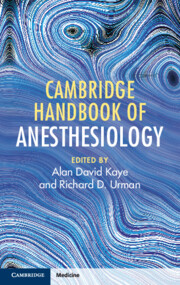Book contents
- Cambridge Handbook of Anesthesiology
- Cambridge Handbook of Anesthesiology
- Copyright page
- Dedication
- Contents
- Contributors
- Introduction
- Chapter 1 Preoperative Evaluation and Coexisting Disease
- Chapter 2 Airway Management
- Chapter 3 Anesthesia Equipment: Clinical Considerations
- Chapter 4 Patient Monitoring
- Chapter 5 Inhalational Anesthetics
- Chapter 6 Intravenous Anesthetics and Adjunctive Agents
- Chapter 7 Pharmacology of Local Anesthetics
- Chapter 8 Anesthesia Techniques: Mild, Moderate, and Deep Sedation in Clinical Practice
- Chapter 9 Anesthesia Techniques: General Anesthesia Techniques in Clinical Practice
- Chapter 10 Postanesthesia Care Unit
- Chapter 11a Regional Anesthesia: Blocks of the Upper and Lower Extremities
- Chapter 11b Regional Anesthesia: Chest and Abdominal Plane Blocks
- Chapter 12 Fluid and Electrolyte Balance
- Chapter 13 Blood Transfusion Components and Complications in Anesthesiology
- Chapter 14 Cardiac Anesthesiology
- Chapter 15 Vascular Anesthesia
- Chapter 16 Thoracic Anesthesia
- Chapter 17 Neuroanesthesia
- Chapter 18 Renal Anesthesiology in Clinical Practice
- Chapter 19 Anesthesia for General Surgical Procedures
- Chapter 20 Anesthesia for Endocrine Diseases
- Chapter 21 Anesthesia for Neuromuscular and Collagen Vascular Diseases
- Chapter 22 Anesthesia for Ocular, Ear, and Throat Diseases
- Chapter 23 Orthopedic Anesthesia
- Chapter 24 Obstetric and Gynecologic Anesthesia
- Chapter 25 Pediatric Anesthesia
- Chapter 26 Geriatric Anesthesia
- Chapter 27 Anesthesia for Ambulatory Surgical Procedures
- Chapter 28 Chronic Pain Medicine
- Chapter 29 Acute Pain Management
- Chapter 30 Anesthetic Emergencies
- Chapter 31 Trauma Anesthesia
- Chapter 32 Perioperative Cognitive Disorders
- Chapter 33 Acute Pain Management in the ICU
- Chapter 34 Infection Control for the Anesthesia Provider
- Chapter 35 Coagulation
- Index
- References
Chapter 32 - Perioperative Cognitive Disorders
Published online by Cambridge University Press: 24 May 2023
- Cambridge Handbook of Anesthesiology
- Cambridge Handbook of Anesthesiology
- Copyright page
- Dedication
- Contents
- Contributors
- Introduction
- Chapter 1 Preoperative Evaluation and Coexisting Disease
- Chapter 2 Airway Management
- Chapter 3 Anesthesia Equipment: Clinical Considerations
- Chapter 4 Patient Monitoring
- Chapter 5 Inhalational Anesthetics
- Chapter 6 Intravenous Anesthetics and Adjunctive Agents
- Chapter 7 Pharmacology of Local Anesthetics
- Chapter 8 Anesthesia Techniques: Mild, Moderate, and Deep Sedation in Clinical Practice
- Chapter 9 Anesthesia Techniques: General Anesthesia Techniques in Clinical Practice
- Chapter 10 Postanesthesia Care Unit
- Chapter 11a Regional Anesthesia: Blocks of the Upper and Lower Extremities
- Chapter 11b Regional Anesthesia: Chest and Abdominal Plane Blocks
- Chapter 12 Fluid and Electrolyte Balance
- Chapter 13 Blood Transfusion Components and Complications in Anesthesiology
- Chapter 14 Cardiac Anesthesiology
- Chapter 15 Vascular Anesthesia
- Chapter 16 Thoracic Anesthesia
- Chapter 17 Neuroanesthesia
- Chapter 18 Renal Anesthesiology in Clinical Practice
- Chapter 19 Anesthesia for General Surgical Procedures
- Chapter 20 Anesthesia for Endocrine Diseases
- Chapter 21 Anesthesia for Neuromuscular and Collagen Vascular Diseases
- Chapter 22 Anesthesia for Ocular, Ear, and Throat Diseases
- Chapter 23 Orthopedic Anesthesia
- Chapter 24 Obstetric and Gynecologic Anesthesia
- Chapter 25 Pediatric Anesthesia
- Chapter 26 Geriatric Anesthesia
- Chapter 27 Anesthesia for Ambulatory Surgical Procedures
- Chapter 28 Chronic Pain Medicine
- Chapter 29 Acute Pain Management
- Chapter 30 Anesthetic Emergencies
- Chapter 31 Trauma Anesthesia
- Chapter 32 Perioperative Cognitive Disorders
- Chapter 33 Acute Pain Management in the ICU
- Chapter 34 Infection Control for the Anesthesia Provider
- Chapter 35 Coagulation
- Index
- References
Summary
Abnormal cognitive aging includes unexpected changes in cognition or memory functions. Changes can present either acutely or gradually. Within the Diagnostic and Statistical Manual of Mental Disorders, fifth edition (DSM-5) by the American Psychiatric Association (APA) [1], abnormal cognitive profiles are divided into Mild Neurocognitive Disorder and Major Neurocognitive Disorder (also known as dementia).
- Type
- Chapter
- Information
- Cambridge Handbook of Anesthesiology , pp. 485 - 496Publisher: Cambridge University PressPrint publication year: 2023

